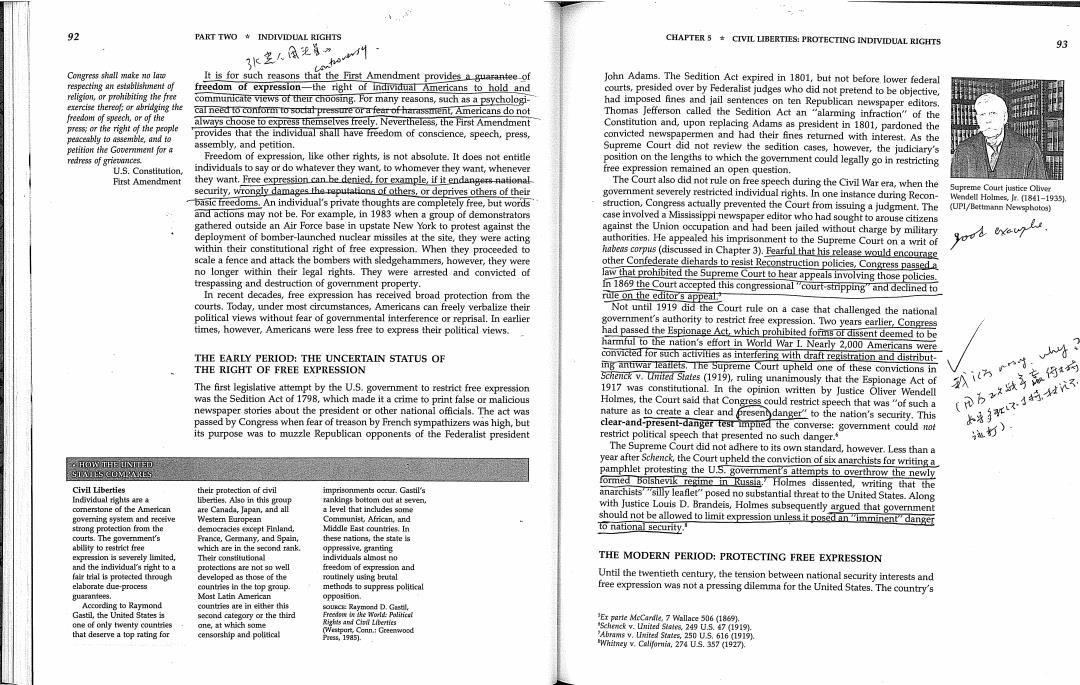正在加载图片...

名 PART TWO INDIVIDUAL RIGHTS CHAPTER 5+CIVIL LIBERTIES:PROTECTING INDIVIDUAL RIGHTS 3史人国老员” 93 w1 It is for such reasons that the First Amendment provides aguarantee of John Adams.The Sedition Act expired in 1801,but not before lower federal respecting an estabilshment of freedom of expression-the right of individual Americans to hold and courts,presided over by Federalist judges who did not pretend to be objective, religion,or prohibiting the fre communicate views of their choosing.For many reasons,such as a psychologi- had imposed fines and jail sentences on ten Republican newspaper editors. cal need to conform to pressure or a fear of harassment,Americans do not freedom of speech,or of the Thomas Jefferson called the Sedition Act an "alarming infraction"of the always choose to express themselves freely.Nevertheless,the First Amendment provides that the individual shall have freedom of conscience,speech,press, Constitution and,upon replacing Adams as president in 1801,pardoned the convicted newspapermen and had their fines returned with interest.As the efition the Govermment for年 assembly,and petition. Supreme Court did not review the sedition cases,however,the judiciary's Freedom of expression,like other rights,is not absolute.It does not entitle position on the lengths to which the government could legally go in restricting U.S.Constitution, individuals to say or do whatever they want,to whomever they want,whenever free expression remained an open question. First Amendment they want.Free expression can be denied,for example,if it endangers national The Court also did not rule on free speech during the Civil War era,when the security,wrongly damages the reputatians of others,or deprives others of their goverment severely restricted individual rights.In one instance during Recon- preme Court justice Oliver basic freedoms.An individual's private thoughts are completely free,but words Ho mes日.1841-1935) struction,Congress actually prevented the Court from issuing a judgment.The and actions may not be.For example,in 1983 when a group of demonstrators case involved a Mississippi newspaper editor who had sought to arouse citizens (UPl/Bettmann Newsphotoe) gathered outside an Air Force base in upstate New York to protest against the against the Union occupation and had been jailed without charge by military deployment of bomber-launched nuclear missiles at the site,they were acting within their constitutional right of free expression.When they proceeded to authorities.He appealed his imprisonment to the Supreme Court on a writ of scale a fence and attack the bombers with sledgehammers,however,they were habens corpus(discussed in Chapter 3).Fearfulthat his release would encourage other Confederate diehards to resist Reronstruction policies,Congress passeda no longer within their legal rights.They were arrested and convicted of law that prohibited the Supreme Court to hear appeals involving those policies. trespassing and destruction of government property. In recent decades,free expression has received broad protection from the n 1869 the Court accepted this congressional"coustrpping"and declined to rule on the editor's appeal. courts.Today,under most circumstances,Americans can freely verbalize their Not until 1919 did the Court rule on a case that challenged the national political views without fear of governmental interference or reprisal.In earlier government's authority to restrict free expression.Two years earlier,Congress times,however,Americans were less free to express their political views. had passed the Espionage Act which prohibited forms o dissent deemed to be harmful to the nation's effort in World War I Nearly 2,000 Americans were THE EARLY PERIOD:THE UNCERTAIN STATUS OF convicted for such activities as interfering with draft registration and distribut- THE RIGHT OF FREE EXPRESSION ing antiwar leailets.The Supreme Court upheld one of these convictions in Schenck v.United Siates (1919),ruling unanimously that the Espionage Act of 羽方nn为. The first legislative attempt by the U.S.government to restrict free expression was the Sedition Act of 1798,which made it a crime to print false or malicious 1917 was constitutional.In the opinion written by Justice Oliver Wendell Holmes,the Court said that Congress could restrict speech that was "of such a (见方z女蛛多蔬何端 newspaper stories about the president or other national officials.The act was nature as to create a clear and fresent)danger"to the nation's security.This passed by Congress when fear of treason by French sympathizers was high,but clear-and-present-danger tesr mpted the converse:goverment could ot k学欢不子,材状了 its purpose was to muzzle Republican opponents of the Federalist president restrict political speech that presented no such danger. 越打) The Supreme Court did not adhere to its own standard,however.Less than a 。HOW THE UNITED year after Schenck,the Court upheld the conviction of six anarchists for writing a GIATISCOMPARES pamphlet protesting the U.S.govemment's attempts to overthrow the newly Civil Liberties their protection of civil imprisonments occur.Gastil's ormed Botshevik regime in Russia.Holmes dissented,writing that the ndividual rghes are a liberties.Also in this group rankings bottom out at seven. anarchists"silly leaflet"posed no substantial threat to the United States.Along comnerstone of the Amertcan are Canad由,hpn,and all a level that includes some with Justice Louis D.Brandeis,Holmes subsequently argued that government goverring system and receive Westem European Comnmunist,African,and should not be allowed to limit expression unless it posed an "imminent"danger strong protection from the demecracies exeept Finland, Middle East countries.In to national security. urts.The government's and these natioos.the state is which are in th rely mlted and the Their constitutional THE MODERN PERIOD:PROTECTING FREE EXPRESSION protections are not so well freedom of expression and air trial is protected thro四gh developed as those of the routinely using brutal Until the twentieth century,the tension between national security interests and elaborate due-process countries in the top group. methods to suppress political free expression was not a pressing dilemma for the United States.The country's 《ot istin Ameri.n Accoeding to Raymond our are in either this Gastal,the United Se Er parte McCanfie,7 Wallace 506 (1869) one,at chemck v.United Stohes,249 U.5.47 (1919). censorship and political Wan 37